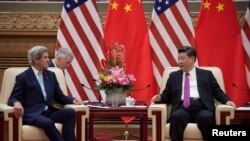The top U.S. diplomat says he has directly and forcefully expressed to leaders in Beijing his concerns about China's new and controversial law managing the operation of foreign non-government organizations.
Visiting Secretary of State John Kerry said he discussed the measure with China's president, Xi Jinping. He said Xi and other senior Chinese officials said the aim of the law is to help, not harm, the industry.
"I thought it was not insignificant that the president of the country spoke very directly to what he wants to see happen," said Kerry, adding Xi told him directly that China would apply the law fairly.
Kerry said Xi also told him that China intends to "open up even more than it is from today," and the new NGO law regulating foreign non-governmental organizations will not be applied in any way to affect the ability of foreign businesses to feel confident operating there.
Increasingly, however, that is just how businesses in China say they are feeling — unwelcome and burdened with increasing regulation.
Kerry said that from the time the review process for the law began, the United States "could have not registered our concerns more directly or forcefully," but, he added, "we have to show some patience, if you will, to see how, in fact, it is interpreted.”
Critics’ concerns
Rights groups have urged Chinese authorities to scrap — or at the very least revise — the legislation, arguing it is out of sync with international standards. There are widespread concerns about the law's restrictions and the impact it could have on foreign NGOs and their Chinese partners.
Experts said the interpretation of how NGO laws are implemented gives Beijing authorities more flexibility to selectively target organizations. The law requires foreign NGOs to find Chinese partners to register with the police. Authorities will be permitted to review all aspects of the NGO operations and finances at any time.
The Foreign NGO Management Law was one of several touchy topics U.S. officials shared their differences and concerns about during high-level Strategic and Economic Dialogue talks Monday and Tuesday in Beijing.
The implementation of NGO law cast a shadow between the two countries while top officials endeavored to promote people-to-people exchanges.
‘Big picture’
During talks with Chinese Vice Premier Liu Yandong in the bilateral People's Exchange meeting, Kerry said Liu "made guarantees" the new statute would be carried out "in good spirit."
Kerry said this week's meeting was the most constructive of the four Strategic and Economic Dialogue talks he has participated in and argued that while the two countries clearly have their differences, there is far more agreement than disagreement and far more areas of cooperation.
"We are looking at the big picture because we think that the big picture is what many people want two big important nations such as ours to focus on," Kerry said. "Not to be dragged down into squabbles that lend more sense of disarray, more chaos or failed leadership to a world that already has enough challenges."
The talks included regional security, implementation of a climate agreement, global health security and global nuclear security.
U.S. officials said the Beijing meetings will help pave the way for China to host the Group of 20 leaders summit and a meeting between presidents Xi Jinping and Barack Obama.











